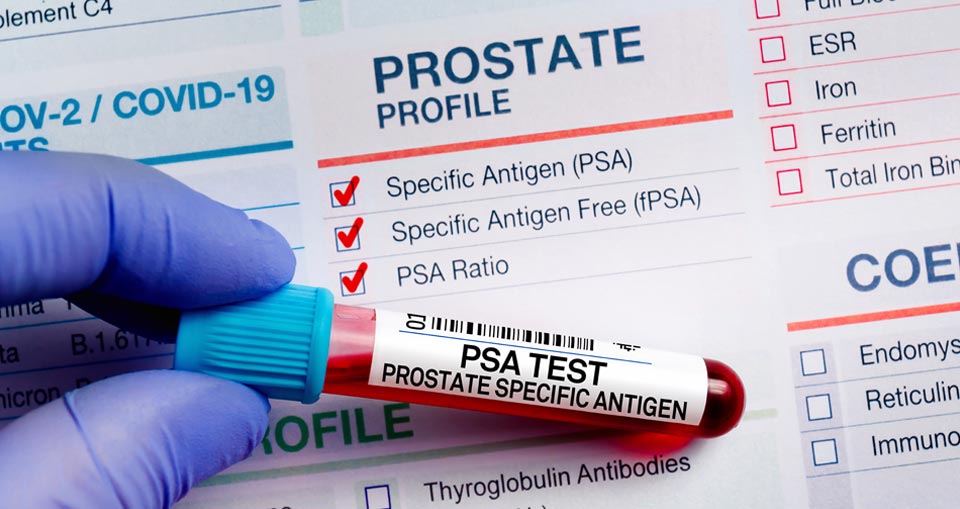PSA BLOOD TEST

Do I Need a PSA Blood Test?
PSA stands for Prostate Specific Antigen. It is a chemical produced only by prostate cells, both normal and cancerous. It is measured by a simple blood test.
Your physician should carefully review your PSA level. In the past, a PSA of 4 was thought to be ‘normal’.
We now know that PSA depends on your age and the size of your prostate, amongst other factors.
A PSA of 2 may be abnormal for a young man. As men age, the normal level for PSA increases.
Your physician will be alerted if your PSA is above what is expected for your age or if it shows a rise from the prior year.
Not all cancers can be found by PSA screening alone. It is important that you also have regular physical exams to feel for abnormal growths of the prostate.
Informed Decision Making
The decision to get tested is one that a man should make with his doctor following a careful discussion.
This conversation should include not only the benefits and risks of screening but a man’s personal and family medical history.
ASK THE DOCTOR
CLICK HERE
TREATMENT HOURS
Mon: 6:30am – 5:30pm
Tues: 6:30am – 5:30pm
Wed: 6:30am – 5:30pm
Thurs: 6:30am – 5:30pm
Fri: 6:30am – 5:30pm
Sat: CLOSED
Sun: CLOSED
PAGE: Print | PDF | Email
Interpreting Results
Men choosing to undergo PSA testing should remember these important factors about the test results:
-
- Three common prostate diseases- prostatitis, benign prostatic hyperplasia (BPH), and prostate cancer-can all-cause elevated PSA levels in the blood.
- PSA levels tend to increase with age.
- Larger prostates produce larger amounts of PSA.
- Medications, trauma or certain medical procedures (such as a prostate biopsy or cystoscopy) can affect PSA test results.
- Change in PSA levels over time, known as PSA velocity, is used to assess both cancer risk and aggressiveness. Men whose PSA levels rise sharply over a short period are more likely to have prostate cancer than those who do not see significant changes in their PSA velocity.
What do I do if My PSA or Physical Exam is Abnormal?
If your physician detects an abnormal PSA or a lump on your prostate on the exam, you will be referred to a Urologist for evaluation and possible biopsy. This is a simple procedure that can be done in a few minutes in their office. If the biopsy is positive, the cancer is assigned a Gleason score between 2 -10; with 2 being a slower growing type of cancer and 10 a more aggressive type.
Diagnosis & Staging
What do you do if your PSA blood test or physical exam is abnormal?
If your primary care physician detects an abnormal PSA or a lump in your prostate during a physical exam, you will be referred to a Urologist for evaluation and consideration for a biopsy. This is a simple procedure that can be done in a few minutes in the Urologist’s office. With an ultrasound in the rectum, thin needles can be inserted into the prostate to remove tiny fragments for evaluation. Typically at least eight biopsies are performed, four from each side of the prostate. These biopsies are sent to a lab where a physician will determine if cancer is present. If so, they will then determine how aggressive the cancer is. A scoring system, called the Gleason score, assigns the cancer a number from 2 – 10, with 2 being a less aggressive cancer, and 10 being a more aggressive cancer.
Prostate Cancer Screening Guidelines
(PSA Test and Physical Examination)
- African-American Men: Yearly, starting at 40
- Men with a family history of prostate cancer: Yearly, starting at 40
- All other men: Yearly, starting at 50
PSA SCREENING REDUCES MORTALITY BY 21%1
Early detection is the hallmark of the successful treatment of prostate cancer. Usually, there are no warning signs for prostate cancer. As cancer progresses, symptoms can be very non-specific and might include a change in urinary or bowel habits or a new onset of bone pain. Regular physical exams and PSA blood tests aid in the early diagnosis of prostate cancer.
Prostate Cancer Screening Saves Lives!
1. New England Journal of Medicine 2012
EXPERT & EXPERIENCED: TALK TO A PROSTATE CANCER TREATMENT EXPERT
Get a second opinion on your prostate cancer treatment options from Florida Center For Prostate Care, your prostate cancer treatment experts.